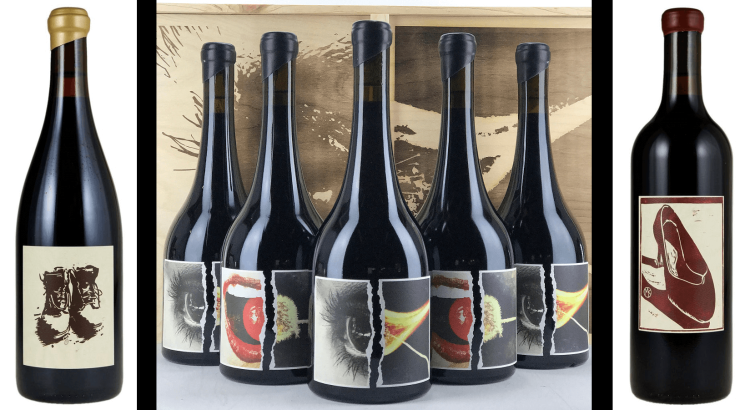
Allgemein
22.02.2024
7 Fragen an Nik Krankl (Fingers Crossed) über 'Alte vs. Neue Welt'
Wir haben zu diesem interessanten Thema einigen unseren Partnerwinzern aus Kalifornien, Frankreich und Österreich sieben spannende Fragen gestellt um ihre persönliche Sichtweise zu erfahren. In unserer Zusammenfassung findet ihr die wichtigsten Aussagen von Andi Kollwentz, Nik Krankl, César Perrin und Mark McWilliams in Deutsch. Nachstehend die ausführlichen von Nik Krankl in Englisch und natürlich gibt es auch die passende Weinselektion. Wir bekommen in Kürze auch den neuen Jahrgang, alle verfügbaren Weine findet ihr unter diesem Link

Historically the wine world has been divided in an ‚old world’ and a ‚new world‘. What do consider the main factors having led to this differentiation?
The main divide between the old world vs. new world is born from the fact that some places (old world) have been making wine for longer. These estates are typically passed down through multiple generations and there is a long legacy to uphold. In that, comes many ideas that are quite traditional because they have been continued for many years and knowledge has been passed down from their ancestors. In the "new world" which as it relates to me is California, we do not have the same length of time as winemakers/winegrowers. My father is a 1st generation winemaker and I am the 2nd. As such, we have far fewer "rules" as they pertain to our process because of the very nature that we have been doing it for less time. We are free to experiment and discover in all facets of the journey, and we are able to keep an open mind to the practice. With experimentation comes wonderful discoveries and successes, as well as trial and error. Furthermore, we are far less restricted by the government by permitted grape varieties, blends, irrigation, etc...this allows us to create wines with a broad, creative and less defined palette.
Do you think this differentiation is still valid and why (not)?
Yes, I believe this is helpful for the consumer to understand why wines born from different places are unique. The world of wine is vast, and anyway to help consumers comprehend and appreciate the different styles, the better.
Do you think that consumer preferences in the ‚old world‘ and ‚new world’ are different and have influenced wine makers?
Of course! What we prefer is so often dictated by what we have been exposed to. If you grew up in Burgundy drinking light-bodied Pinot Noir or racy Chardonnay, perhaps you will not find an Australian Shiraz or a Paso Robles Cabernet to suit your taste. Not to say that one is better or worse, but we are all certainly creatures of habit to some extent. With that said, clearly one should keep an open mind because there are a great deal of discoveries to be made, if one knows where and from whom to look. As this relates to how the customer preference has "influenced winemakers," well, I suppose that depends on the winemaker. Many will try to match a style they believe will be popular and hopefully sold easily. Others believe in what they are making, stick to their guns, and have confidence that if they stay true to their style those who appreciate it will seek it out.
Being part of the old / new world, have you been influenced by trends / techniques / experiences / role models from the ‚other‘ side of the world?
Without a doubt. As a wine lover, I enjoy wines from all over the world made by different techniques and find them to be most delicious. Of course one cannot simply say I like Grenache from Chateauneuf du Pape and then replicate that somewhere else. This does not and will not work. Your local climate dictates what type of fruit can be grown, and how, and thus the wines will certainly be unique to place. With that in mind, one can certainly adopt certain principles and styles from the other side of the world when and where they work. And without a doubt a role model is always a positive influence to encourage growth and new ideas.
How would you describe the style of your winery in the context of ‚old & new world‘?
Fingers Crossed would certainly be described as new world. Again, this mostly comes from the freedom we are able to express in our blends, our farming, and even the bottling/labelling of our wines. We have no boundaries, and we have no history to uphold. We are free to pave our own road, and we are so very fortunate to have this privilege. Perhaps in the future my great-grandchildren will feel differently as they inherit a wealth of knowledge and approach...but I hope that their desire to innovate and try new things is relentless!
How much of your wine production is going to ‚old world‘ vs. ‚new world‘ markets?
We predominantly sell our wines direct to consumers in the United States. Some savvy wine enthusiasts go to great lengths to hunt down and export our wines, but at this time that only accounts for a miniscule part of our already miniscule production.
Do you see new border lines in the wine world which are more up to date?
I see climate change impacting most of the wine world. Producers that are paying attention to their environment will have to adapt and try new things if they intend on keeping up with the changing weather patterns. I see wineries such as Drouhin from Burgundy setting up vineyards and wine making facilities in Oregon. I see people like Dave Phinney making wines from vineyards all around the world and then applying his Californian-style to them. This is a hard question to answer, but I believe the lines (for wine and most things) will continue to blur as the world becomes more and more flat as a result of technological advancements.

Historically the wine world has been divided in an ‚old world’ and a ‚new world‘. What do consider the main factors having led to this differentiation?
The main divide between the old world vs. new world is born from the fact that some places (old world) have been making wine for longer. These estates are typically passed down through multiple generations and there is a long legacy to uphold. In that, comes many ideas that are quite traditional because they have been continued for many years and knowledge has been passed down from their ancestors. In the "new world" which as it relates to me is California, we do not have the same length of time as winemakers/winegrowers. My father is a 1st generation winemaker and I am the 2nd. As such, we have far fewer "rules" as they pertain to our process because of the very nature that we have been doing it for less time. We are free to experiment and discover in all facets of the journey, and we are able to keep an open mind to the practice. With experimentation comes wonderful discoveries and successes, as well as trial and error. Furthermore, we are far less restricted by the government by permitted grape varieties, blends, irrigation, etc...this allows us to create wines with a broad, creative and less defined palette.
Do you think this differentiation is still valid and why (not)?
Yes, I believe this is helpful for the consumer to understand why wines born from different places are unique. The world of wine is vast, and anyway to help consumers comprehend and appreciate the different styles, the better.
Do you think that consumer preferences in the ‚old world‘ and ‚new world’ are different and have influenced wine makers?
Of course! What we prefer is so often dictated by what we have been exposed to. If you grew up in Burgundy drinking light-bodied Pinot Noir or racy Chardonnay, perhaps you will not find an Australian Shiraz or a Paso Robles Cabernet to suit your taste. Not to say that one is better or worse, but we are all certainly creatures of habit to some extent. With that said, clearly one should keep an open mind because there are a great deal of discoveries to be made, if one knows where and from whom to look. As this relates to how the customer preference has "influenced winemakers," well, I suppose that depends on the winemaker. Many will try to match a style they believe will be popular and hopefully sold easily. Others believe in what they are making, stick to their guns, and have confidence that if they stay true to their style those who appreciate it will seek it out.
Being part of the old / new world, have you been influenced by trends / techniques / experiences / role models from the ‚other‘ side of the world?
Without a doubt. As a wine lover, I enjoy wines from all over the world made by different techniques and find them to be most delicious. Of course one cannot simply say I like Grenache from Chateauneuf du Pape and then replicate that somewhere else. This does not and will not work. Your local climate dictates what type of fruit can be grown, and how, and thus the wines will certainly be unique to place. With that in mind, one can certainly adopt certain principles and styles from the other side of the world when and where they work. And without a doubt a role model is always a positive influence to encourage growth and new ideas.
How would you describe the style of your winery in the context of ‚old & new world‘?
Fingers Crossed would certainly be described as new world. Again, this mostly comes from the freedom we are able to express in our blends, our farming, and even the bottling/labelling of our wines. We have no boundaries, and we have no history to uphold. We are free to pave our own road, and we are so very fortunate to have this privilege. Perhaps in the future my great-grandchildren will feel differently as they inherit a wealth of knowledge and approach...but I hope that their desire to innovate and try new things is relentless!
How much of your wine production is going to ‚old world‘ vs. ‚new world‘ markets?
We predominantly sell our wines direct to consumers in the United States. Some savvy wine enthusiasts go to great lengths to hunt down and export our wines, but at this time that only accounts for a miniscule part of our already miniscule production.
Do you see new border lines in the wine world which are more up to date?
I see climate change impacting most of the wine world. Producers that are paying attention to their environment will have to adapt and try new things if they intend on keeping up with the changing weather patterns. I see wineries such as Drouhin from Burgundy setting up vineyards and wine making facilities in Oregon. I see people like Dave Phinney making wines from vineyards all around the world and then applying his Californian-style to them. This is a hard question to answer, but I believe the lines (for wine and most things) will continue to blur as the world becomes more and more flat as a result of technological advancements.
